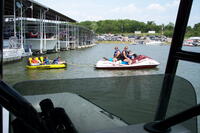Personal Watercraft
Personal Watercraft (PWC)
PWCs are Class A boats and must comply with all boating laws, registration procedures, operation and equipment requirements in addition to the regulations specific to PWCs. Any person between the ages of 12 and 20 who wishes to operate a PWC without being under direct and audible supervision must complete an approved boater education course.
Direct and audible supervision is defined as a person on board the same vessel and in sufficiently close proximity of the operator's station to enable such person to quickly and safely assume control of such vessel if needed. (KSA 32-1125e) The supervising adult must be at least 18 years of age and either have completed a boater education course or be exempt because they are over they age of 21. No one under the age of 12 may operate a motorized vessel without direct and audible supervision regardless of boater education certification.
- Every person on board a PWC is required to wear a USCG approved personal floation device. Inflatable life jackets are not allowed.
- Each person operating a PWC equipped with a lanyard engine cut-off shall attach the lanyard to the operator's person, clothing, or life jacket.
- PWCs are not legal to operate between sunset and sunrise.
- PWC shall be operated at no wake speeds (5 mph or less) within 200 feet of any dock, boat ramp, swimmer, bridge, moored or anchored boats, sewage pump-out facilities, a boat storage facility, concessionaire's facility, or non-motorized watercraft.
- A person shall not operate a PWC unless facing forward.
- If you use a PWC to tow a skier or person on a tube, the PWC has to be equipped with mirrors or you will need a spotter over the age of 12. The person being towed counts towards the capacity of the PWC. (If you have a spotter and are pulling one person, you would need a PWC rated for three (3) people.)
- Maneuvers which unreasonably endanger others are not permitted. This includes, but is not limited to, wake jumping and weaving through vessel traffic.








